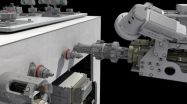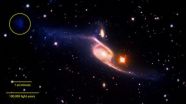(Press-News.org) JUPITER, FL, January 10, 2013 – Oxidative stress is a primary villain in a host of diseases that range from cancer and heart failure to Alzheimer's disease, Amyotrophic Lateral Sclerosis and Parkinson's disease. Now, scientists from the Florida campus of The Scripps Research Institute (TSRI) have found that blocking the interaction of a critical enzyme may counteract the destruction of neurons associated with these neurodegenerative diseases, suggesting a potential new target for drug development.
These findings appear in the January 11, 2013 edition of The Journal of Biological Chemistry.
During periods of cellular stress, such as exposure to UV radiation, the number of highly reactive oxygen-containing molecules can increase in cells, resulting in serious damage. However, relatively little is known about the role played in this process by a number of stress-related enzymes.
In the new study, the TSRI team led by Professor Philip LoGrasso focused on an enzyme known as c-jun-N-terminal kinase (JNK). Under stress, JNK migrates to the mitochondria, the part of the cell that generates chemical energy and is involved in cell growth and death. That migration, coupled with JNK activation, is associated with a number of serious health issues, including mitochondrial dysfunction, which has long been known to contribute to neuronal death in Parkinson's disease.
The new study showed for the first time that the interaction of JNK with a protein known as Sab is responsible for the initial JNK localization to the mitochondria in neurons. The scientists also found blocking JNK mitochondrial signaling by inhibiting JNK interaction with Sab can protect against neuronal damage in both cell culture and in the brain.
In addition, by treating JNK with a peptide inhibitor derived from a mitochondrial membrane protein, the team was able to induce a two-fold level of protection of neurons in the substantia nigra pars compacta, the brain region devastated by Parkinson's disease.
The study noted that this inhibition leaves all other cell signaling intact, which could mean potentially fewer side effects in any future therapies.
"This may be a novel way to prevent neuron degeneration," said LoGrasso. "Now we can try to make compounds that block that translocation and see if they're therapeutically viable."
INFORMATION:
The first author of the study, "Blocking c-jun-N-terminal Kinase (JNK) Translocation to the Mitochondria Prevents 6-hydroxydopamine-induced Toxicity in vitro and in vivo" is Jeremy W. Chambers, formerly of TSRI and currently at Florida International University. Other authors include Shannon Howard, also of TSRI. For more information on the paper, see http://www.jbc.org/content/early/2012/11/26/jbc.M112.421354.full.pdf
The work was supported by the National Institutes of Health (Grant Number U01NS057153-04) and by The Saul and Theresa Esman Foundation.
Scripps Florida scientists uncover potential drug target to block cell death in Parkinson's disease
2013-01-11
ELSE PRESS RELEASES FROM THIS DATE:
NASA's robotic refueling demo set to jumpstart expanded capabilities in space
2013-01-11
In mid-January, NASA will take the next step in advancing robotic satellite-servicing technologies as it tests the Robotic Refueling Mission, or RRM aboard the International Space Station. The investigation may one day substantially impact the many satellites that deliver products Americans rely upon daily, such as weather reports, cell phones and television news.
During five days of operations, controllers from NASA and the Canadian Space Agency will use the space station's remotely operated Special Purpose Dexterous Manipulator, or Dextre, robot to simulate robotic ...
Study finds poorer outcomes for obese patients treated for lumbar disc herniation
2013-01-11
Rosemont, Ill. – While obese patients are more likely to have surgical treatment for lumbar disc herniation – a slipped or ruptured disc – than nonobese patients, obesity increases operative time, blood loss and length of hospital stay, according to new research published in the January 2013 Journal of Bone and Joint Surgery (JBJS). Overall, obese patients had poorer outcomes with surgical and nonsurgical treatments for lumbar disc herniation than nonobese patients.
The study included 854 nonobese patients with a Body Mass Index (BMI) of less than 30 kg/m², and 336 ...
Virus caught in the act of infecting a cell
2013-01-11
AUSTIN, Texas — The detailed changes in the structure of a virus as it infects an E. coli bacterium have been observed for the first time, report researchers from The University of Texas at Austin and The University of Texas Health Science Center at Houston (UT Health) Medical School this week in Science Express.
To infect a cell, a virus must be able to first find a suitable cell and then eject its genetic material into its host. This robot-like process has been observed in a virus called T7 and visualized by Ian Molineux, professor of biology at The University of Texas ...
Stem cells found to heal damaged artery in lab study
2013-01-11
Scientists at the Texas Biomedical Research Institute have for the first time demonstrated that baboon embryonic stem cells can be programmed to completely restore a severely damaged artery. These early results show promise for eventually developing stem cell therapies to restore human tissues or organs damaged by age or disease.
"We first cultured the stem cells in petri dishes under special conditions to make them differentiate into cells that are the precursors of blood vessels, and we saw that we could get them to form tubular and branching structures, similar to ...
UC Davis study deflates notion that pear-shaped bodies more healthy than apples
2013-01-11
(SACRAMENTO, Calif.) — People who are "apple-shaped" — with fat more concentrated around the abdomen — have long been considered more at risk for conditions such as heart disease and diabetes than those who are "pear-shaped" and carry weight more in the buttocks, hips and thighs.
But new research conducted at UC Davis Health System published in The Journal of Clinical Endocrinology and Metabolism provides further evidence that the protective benefits of having a pear-body shape may be more myth than reality. The journal article posted online January 10 and will appear ...
Oxygen to the core
2013-01-11
LIVERMORE, Calif. -- An international collaboration including researchers from Lawrence Livermore National Laboratory has discovered that the Earth's core formed under more oxidizing condition's than previously proposed.
Through of series of laser-heated diamond anvil cell experiments at high pressure (350,000 to 700,000 atmospheres of pressure) and temperatures (5,120 to 7,460 degrees Fahrenheit), the team demonstrated that the depletion of siderophile (also known as "iron loving") elements can be produced by core formation under more oxidizing conditions than earlier ...
NASA's GALEX reveals the largest-known spiral galaxy
2013-01-11
The spectacular barred spiral galaxy NGC 6872 has ranked among the biggest stellar systems for decades. Now a team of astronomers from the United States, Chile and Brazil has crowned it the largest-known spiral, based on archival data from NASA's Galaxy Evolution Explorer (GALEX) mission, which has since been loaned to the California Institute of Technology, Pasadena
Measuring tip-to-tip across its two outsized spiral arms, NGC 6872 spans more than 522,000 light-years, making it more than five times the size of our Milky Way galaxy.
"Without GALEX's ability to detect ...
Saliva gland test for Parkinson's shows promise, study finds
2013-01-11
PHOENIX — Described as a "big step forward" for research and treatment of Parkinson's disease, new research from Mayo Clinic in Arizona and Banner Sun Health Research Institute suggests that testing a portion of a person's saliva gland may be a way to diagnose the disease. The study was released today and will be presented at the American Academy of Neurology's annual meeting in San Diego in March.
"There is currently no diagnostic test for Parkinson's disease," says study author Charles Adler, M.D., Ph.D., a neurologist with Mayo Clinic in Arizona. "We have previously ...
Inclusion of CTC as HEDIS screening modality could increase colorectal cancer screening compliance
2013-01-11
Availability of CT colonography (CTC), commonly known as virtual colonoscopy, is increasing colorectal cancer (CRC) screening rates across military medical facilities. Inclusion of CTC as a Healthcare Effectiveness Data and Information Set® (HEDIS®)-compliant colorectal cancer (CRC) screening test can potentially raise overall screening rates, according to a study in the January issue of the Journal of the American College of Radiology.
The National Committee for Quality Assurance developed HEDIS to provide quality measures for the evaluation of standards of medical ...
Foods identified as 'whole grain' not always healthy
2013-01-11
Boston, MA – Current standards for classifying foods as "whole grain" are inconsistent and, in some cases, misleading, according to a new study by Harvard School of Public Health (HSPH) researchers. One of the most widely used industry standards, the Whole Grain Stamp, actually identified grain products that were higher in both sugars and calories than products without the Stamp. The researchers urge adoption of a consistent, evidence-based standard for labeling whole grain foods to help consumers and organizations make healthy choices. This is the first study to empirically ...



